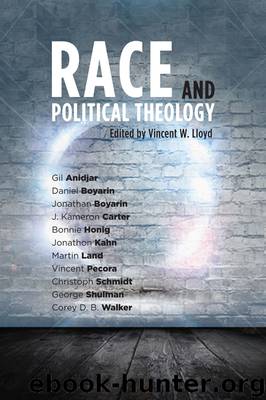Race and Political Theology by Lloyd Vincent;

Author:Lloyd, Vincent;
Language: eng
Format: epub
Publisher: Stanford University Press
Published: 2012-06-14T16:00:00+00:00
CHAPTER 5
THE RACE FOR THEOLOGY
Toward a Critical Political Theology of Freedom
COREY D. B. WALKER
Stuart Hall begins his germinal essay “What Is This ‘Black’ in Black Popular Culture?” with the following question: “What sort of moment is this in which to pose the question of black popular culture?”1 It is this question that enables Hall to open a line of investigation into the cultural logics, economic relations, and political practices that (in)form contemporary racially and ethnically en(re)coded cultural productions. With the displacement of dominant models of European high culture, the consolidation of US global power and the concomitant redefinition and shifting of the focus of cultural production from Europe to America, and the political and intellectual decolonization of the third world, Hall understands the moment of the emergence of this question as critically linked to the changing flows in the geopolitical production of knowledge, power, and culture. Hall seeks to exploit the theoretical opening offered by this reconsideration for exploring the possibilities in creating “new spaces for contestations” that will present an “important opportunity for intervention in the popular cultural field” (466).
Needless to say, the terrain of culture is not a smooth and unambiguous one for Hall. Echoing Antonio Gramsci, Hall recognizes the centrality of the field of culture as a critical terrain in making a difference in political and ideological struggles. To be sure, such struggles are not without their contingencies and contradictions, as “cultural hegemony is never about pure victory or pure domination; it is never a zero-sum cultural game” (468). In staging a critical return to the field of popular culture in our contemporary moment, Hall seeks to engage the dialectic of culture—the ways in which new cultural forms and formations proliferate around the ambiguities of difference and marginalization in relation with a resurgence of new cultural flows that are resistant to the ideas, images, symbols, and politics of such a cultural politics of difference. Such a dialectic attenuates any naïve and nostalgic rendering of culture generally and of popular culture specifically. Indeed, Hall shows the arena of popular culture, bisected as it is by such dichotomies as “high and low; resistance [and] incorporation; authentic [and] inauthentic, experiential [and] formal; opposition [and] homogenization,” to be always already shaped and formed by the mutual contamination of these dyads as well as by the workings of capital (470). But it is with the question of “the black” and the signifier “black” that Hall’s essay gains exceptional critical traction.
Recognizing the critical and material differences that consolidate under the term “black,” Hall’s essay is animated by a central tension within the discourse of difference and popular culture. That is, to echo the criticism of Michelle Wallace, a serious questioning and interrogation of the global ascent of the postmodern as a moment in the (dis)continuity of the “now you see it, now you don’t game that modernism once played with primitivism, to ask whether it is not once again achieved at the expense of the vast silencing about the West’s fascination with the bodies of black men and women of other ethnicities” (467).
Download
This site does not store any files on its server. We only index and link to content provided by other sites. Please contact the content providers to delete copyright contents if any and email us, we'll remove relevant links or contents immediately.
| African-American Studies | Asian American Studies |
| Disabled | Ethnic Studies |
| Hispanic American Studies | LGBT |
| Minority Studies | Native American Studies |
Cecilia; Or, Memoirs of an Heiress — Volume 1 by Fanny Burney(31324)
Cecilia; Or, Memoirs of an Heiress — Volume 3 by Fanny Burney(30928)
Cecilia; Or, Memoirs of an Heiress — Volume 2 by Fanny Burney(30885)
The Great Music City by Andrea Baker(21195)
We're Going to Need More Wine by Gabrielle Union(18065)
Bombshells: Glamour Girls of a Lifetime by Sullivan Steve(13101)
Pimp by Iceberg Slim(12923)
All the Missing Girls by Megan Miranda(12740)
Fifty Shades Freed by E L James(12443)
Norse Mythology by Gaiman Neil(11874)
Talking to Strangers by Malcolm Gladwell(11861)
Crazy Rich Asians by Kevin Kwan(8342)
Mindhunter: Inside the FBI's Elite Serial Crime Unit by John E. Douglas & Mark Olshaker(7828)
The Lost Art of Listening by Michael P. Nichols(6462)
Enlightenment Now: The Case for Reason, Science, Humanism, and Progress by Steven Pinker(6403)
Bad Blood by John Carreyrou(5761)
The Four Agreements by Don Miguel Ruiz(5502)
Weapons of Math Destruction by Cathy O'Neil(5029)
We Need to Talk by Celeste Headlee(4862)
